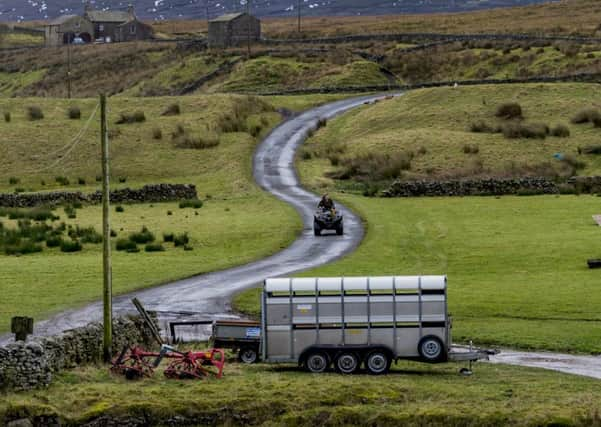YP Comment: Brexit '“ don't forget farmers and potential of rural heartlands


Yet, despite this hiatus, and attempts by prominent Remain campaigners like Tony Blair and Nick Clegg to thwart the will of the people and weaken Theresa May’s negotiating hand, it’s the duty of all Ministers to prepare for Brexit now, and regardless of the contradictory messages from the PM’s strategists Boris Johnson, David Davis and Liam Fox.
This is particularly applicable to agriculture, not least on the day that leaders from the Country Land and Business Association warn Environment Secretary Andrea Leadsom – a prominent Brexit advocate during the referendum – that more needs to be done to empower, and energise, the rural economy.
Advertisement
Hide AdAdvertisement
Hide AdThis call must be heeded. Not only do Yorkshire farmers and rural enterprises feel marginalised by this county’s tortuous devolution process which revolves around the Leeds and Sheffield city-regions, but Defra appears reluctant to seize the Brexit initiative.
As the Rural Payments Agency lurches from one crisis to another over the late payment of EU farm subsides, a recurring issue for the past 15 years, Mrs Leadsom needs to be setting out how this system will work under Brexit once existing arrangements end in 2020. At the very least, farmers need confidence in the robustness of this forward planning. Equally, the Minister should be revealing how farm produce will be labelled to avoid the absurd situation where food imports can carry respected British logos because they’ve simply been packaged here. The more food that can be sourced directly from UK and Yorkshire farms, the better. However issues like this need to be advanced now and not left to 2019 when Britain is due to leave the EU. By then, it will be too late.
Parent power: Lessons on great class divide
ARE pushy parents to blame for the gulf in exam grades between the South and the North? Leeds mother Anne Longfield, the Children’s Commissioner for England, thinks so – she believes one reason why London is now home to so many top schools is because families challenged education leaders in the capital to transform standards.
Of course, some will disagree with this assertion and say some parents already wield too much influence because of the ability of certain families to play the system when it comes to securing places at the very best schools – a regular source of consternation.
Advertisement
Hide AdAdvertisement
Hide AdYet it goes without saying that the most successful schools are invariably those with a thriving Parent-Teacher Association, or such like, which enables families to support teachers and play a more active role in those extra-curricular activities which do require volunteers and additional assistance. Just because a father or mother was not top of the class in their own school days should not deter them – it’s their enthusiasm which is required. After all, education is at its most effective when it is a three-way partnership between parents, pupils and teachers. To this day, this remains the most important lesson of all.
The Home Front: Remembering heroines of WW1
AS the centenaries of World War One’s defining battles are commemorated with solemn appreciation about the sacrifices made in the name of liberty, these landmarks have also led to increased awareness about the losses on the Home Front. This was particularly pertinent at a poignant service to mark the deaths of 35 women who were blown up in a blast at the Barnbow Munitions factory at Crossgates, Leeds. That Historic England has now given this site heritage protection is testament to the importance of its work and the risks encountered far away from the Somme’s merciless battlefields.
It goes beyond this. At a time when society feels divided, and communities fragmented, an increased focus on social history – and local events which shaped the Yorkshire of today – can only help younger generations from all backgrounds, and faiths, to become more appreciative of their surroundings.
Though school history curriculums have become prescriptive because of political interference, there should be scope for projects on tragedies like the Barnbow disaster. In this regard, the past could, in fact, hold the key to unlocking a more cohesive society for the future.